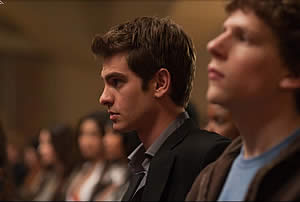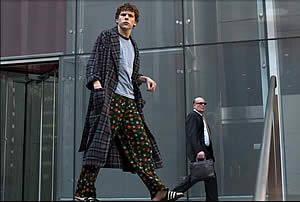
Andrew Garfield (left) and Jesse Eisenberg in The Social Network. (PHOTO SUPPLIED)
Movie Review
By Bernie Jablonski
As most people seem to be saying, The Social Network IS a great, compelling movie. In revealing the details about the evolution of social network Facebook and the personalities involved, we never really lose the fact that although many of these players are pretty unsympathetic, we are drawn deeply into their stories. This is due to the devoted efforts of director David Fincher, screenwriter Aaron Sorkin, and a great cast. Though the story, (as Hollywood biographies usually are) has been embellished and characters tweaked, the result for the viewer is a gamut of emotions, from awe and admiration to feeling guilt for ever using Facebook in the first place.
Fincher is known for helming movies exploring the dark night of the souls of its characters, like the frightening and ultimately depressing Se7en, or other forays into the abyss like Fight Club and Zodiac. The Social Network is hardly light-hearted, but considering how much actual (along with metaphoric) darkness there is in this movie, we are in a similar kind of black hole as we so often find ourselves in Fincher’s other movies. And that begins with the already much-discussed “breakup scene.”
Mark Zuckerberg (Jesse Eisenberg) is having dinner with his girlfriend Erica Albright (Rooney Mara, whom Fincher has already tapped for the much-coveted lead in The Girl with the Dragon Tatoo). In the ensuing four minutes, Erica holds her own with Zuckerberg in a manic, free-wheeling conversation, breaks up with him, and endures his wrath. The speedy though articulate tempo of the scene sets the tone for Eisenberg’s characterization, even though the Internet Movie Database informs us that to keep the 166-page script at a two-hour length, the director had the actors speak some of the dialogue quickly. And that winds up as quite an asset to the movie, intensifying both the suspense and the driven personalities of the people involved.
As Zuckerberg, Eisenberg has divested the character of all the charming vulnerability and naivete he displayed in Zombieland, and presents the computer wunderkind as a self-absorbed, manic, brilliant kid who only very rarely allows us to peek through the armor. Despite all this, Zuckerberg holds our attention, daring us to hate him, but making us totally curious as to how he’ll get through the peaks and valleys he creates. It’s not an enigmatic performance, either- in the end we feel we understand Marc, even though we’re quite sure we would never plunge into the industrial deception and personal deceit that he does.
In his article for Wired magazine, “Sex! Hackers! Embellishment! The Inside Story of the Facebook Movie,” Scott Brown points out that the brilliant speechmaking done by Eisenberg’s Zuckerberg in the movie is a fabrication, a dramatic affect given the character by the screenwriter. Indeed, watching Zuckerberg in his 60 Minutes interview or in other interviews, you get the impression that he is more comfortable with evasion and expresses himself more awkwardly than he does in the movie. But as voiced by Aaron Sorkin, who led us through a complex world in A Few Good Men, the dialogue is never flowery, but seems to come out of a tireless, inwardly focused mind.
After the breakup, Zuckerberg returns to his Harvard dorm, says some nasty things on Harvard’s local Internet about Erica, then leaps into an idea which is eventually called Facemash. Facemash is an Internet application that shows images of Harvard students stolen from the campus database, and asks users to determine whether the persons are “hot” or “not.” With the help of his friend Eduardo Saverin (Andrew Garfield, the new Spider-Man), Facemash is developed into a service that includes around forty other college campuses. Zuckerberg is then approached by Cameron and Tyler Winklevoss (Armie Hammer, great-grandson of the industrialist) and Divya Narendra (Max Minghella), who want him to help develop their own website, which would allow Harvard students to share information with each other.

Jesse Eisenberg. (PHOTO SUPPLIED)
He agrees to do this, but while he is supposedly writing code for the website, Zuckerberg is working on his own information-sharing website, using Saverin’s money to develop it. This website, originally called thefacebook, grows into Facebook, making vast amounts of money for Zuckerman and Saverin, while the Winklevosses, realizing that they’ve been deceived, mount a lawsuit against Zuckerman. It is this thread that forms the framing story of The Social Network.
What makes the movie so irresistible is that it is one of those movies where if someone told you it was about “the founding of Facebook” or “a war between computer geeks,” the idea would probably be greeted with a yawn. It is a movie made up of conversations and accusation, much of it coming at you at a high speed, and the characters, with the exception, perhaps, of Eduardo Saverin, are not easy to relate to or like. The business and legal wrangling, however, draw you in.
As the story unravels through depositions occurring in the present time, three points of view merge: Zuckerman’s, the Winklevosses’, and Saverin’s, probably the one the viewer will be most likely to identify with. Eduardo, however, is no saint. Acting almost as a devoted disciple might, he aids Zuckerberg unquestioningly, but has no compunction in filling the loneliness of his life with the monetary and other types of reward that come to him. His gradual awakening to being betrayed is what grabs us, but even though we wonder about how much of this is brought down upon him by his own fealty to his master. Garfield captures these shadings of character.
One would think that audience sympathy would go to the Winklevoss twins and their friend Divya. Though Minghella does fine work in this part, it is the performance (aided by digital magic) of Hammer as the twins that captivates. We first see them as privileged but gentlemanly young men using their courtliest manners to woo Zuckerberg, but then as impassioned attack dogs when they learn of his betrayal. Again, we have characters who are the type that most of us would love to hate, but the writing and performance is so balanced that we see their point of view, and they do not come off as snooty cartoons. There is a great scene involving them and the university president.
Attention must also be paid to Justin Timberlake, now totally acceptable as a an actor, who plays Sean Parker, founder of Napster, the music file-sharing website that was eventually shut down. This character is typical in stories about the creation of “something big:” the guy with clout. Parker is played unabashedly as a duplicitous person not to be trusted, and one marvels at the honesty (is it “ultrarealism?”) of the portrayal. The character is important in widening the rift between Zuckerberg and Saverin, and Timberlake is riveting.
In the end, we are left with a shattered friendship, an uneasy truth, and the feeling that we’ve been educated in the seamier sides of business. And depending on how sensitive you are, a feeling of guilt for ever using Facebook in the first place. I saw somebody say as much on FB. About time to check it again. I need to know if people are deciding if it’s time to go to bed.








